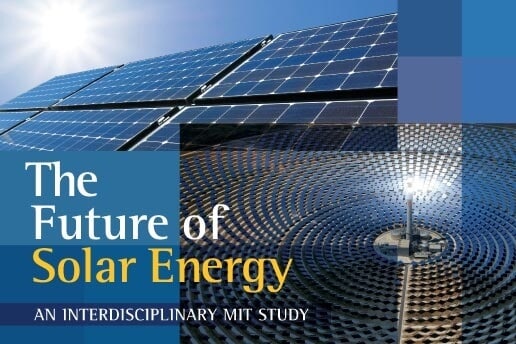Solar energy holds the best potential for meeting humanity’s future long-term energy needs while cutting greenhouse gas emissions – but to realize this potential will require increased emphasis on developing lower-cost technologies and more effective deployment policy, says a comprehensive new study on The Future of Solar Energy released today by The MIT Energy Initiative (MITEI).
“Our objective has been to assess solar energy’s current and potential competitive position and to identify changes in US government policies that could more efficiently and effectively support its massive deployment over the long-term, which we view as necessary,” said Robert Armstrong, Director, MITEI.
The study’s chair, Richard Schmalensee, Howard W. Johnson Professor of Economics and Management Emeritus at the MIT Sloan School of Management, added “What the study shows is that our focus needs to shift toward new technologies and policies that have the potential to make solar a compelling economic option.”
The study group is presenting its findings to lawmakers and senior administration officials this week in Washington, D.C.
The Future of Solar Energy reflects on the technical, commercial and policy dimensions of solar energy today and makes recommendations to policymakers regarding more effective federal and state support for research and development, technology demonstration, and solar deployment.
Among its major themes is the need to prepare our electricity systems, both technically and from a regulatory standpoint, for very large-scale deployment of solar generation – which tends to vary unpredictably throughout the day. To this end, the study emphasizes the need for federal research and development support to advance low-cost, large-scale electricity storage technologies.
The analysis finds that today’s federal and state subsidy programs designed to encourage investment in solar systems should be reconsidered, to increase their cost-effectiveness, with greater emphasis on rewarding production of solar energy.
The group also recommends that state renewable portfolio standards, which are designed to increase generation of electricity from renewable resources, be brought under a unified national program that would reduce the cost of meeting set mandates by allowing unrestricted interstate trading of credits.
The study concludes by pointing to the urgent need for an ambitious and innovative approach to technology development, with federal research and development investment focused on new technologies and systems with the potential to deliver transformative system cost reductions.
The MIT “Future of…” studies are a series of multidisciplinary reports that examine the role various energy sources could play in meeting future energy demand under carbon dioxide emissions constraints. These comprehensive reports are written by multidisciplinary teams of MIT researchers. The research is informed by a distinguished external advisory committee. For more information or a downloadable copy of The Future of Solar Energy study, visit http://mitei.mit.edu/futureofsolar.



I really enjoyed reading this article. My one question is at what point should we try and perfect a technology versus finding a new and better option. You see this all the time with engines, when a company finally gets all the kinks out of a motor the company then comes out with a brand new motor. The new motor doesn’t have the same kinks worked out and ultimately is an engine that doesn’t function as well as its predecessor and then the cycle starts over. I find the same to be true of many other scientific ventures and solar energy perhaps fits into this. Solar energy as you noted needs to be more efficient, but how long is it before solar energy is thrown to the side for a new more promising energy source. I feel that too many times energy sources are not given the amount of time they need before moving on to a next source. I feel that we should continue to work on fine tuning, for lack of a better word, solar energy and some of our other renewable energy sources before we are too quick to abandon them. I feel that looking for new options is great, but perfecting our sources we have now should also be an option.